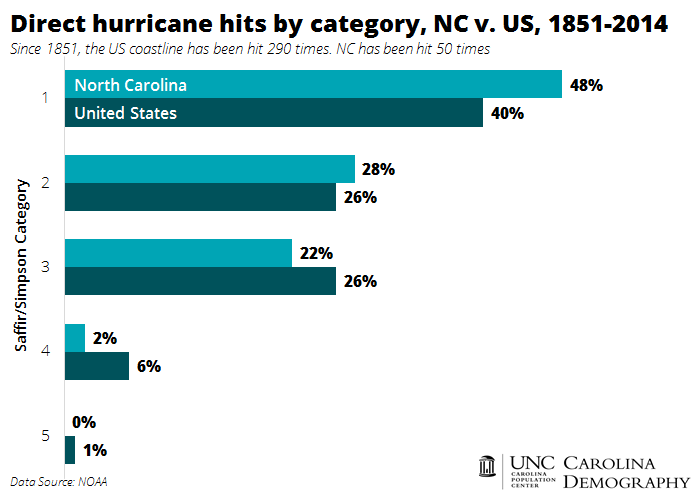NC in Focus: Hurricane Strength, Timing, & Naming
Since 1851, North Carolina has been struck by 50 hurricanes; 12, or 24% of these, have been major hurricanes (category 3 or higher). This is slightly less than the proportion of major hurricanes experienced by the entire U.S. Atlantic coastline over this time period. Two hundred and ninety hurricanes have made landfall on the Atlantic coast since 1851; of these, 92 or nearly one-third (32%) have been major hurricanes.

Although North Carolina is more likely to be hit by Category 1 hurricanes, this does not diminish their destructive power. Hurricane Irene in 2011 made landfall as a category 1 hurricane, and was one of the most destructive storms in recent years. All hurricanes and tropical storms, regardless of their Saffir/Simpson category, have the potential to displace population and significantly impact local housing units and businesses.
Most major hurricanes come in September (50%), with August the second most common month (28%). In North Carolina, major hurricanes are even more concentrated in these months: 58% of major hurricanes have made landfall in September and 33% in August. In total, 91% of the 12 major hurricanes that struck the state between 1851 and 2014 occurred in one of these two months.
The practice of using first names for tropical storms was first implemented in 1953. There are six lists of 21 names (no names are produced for letters Q, U, Z, Y, and Z) that are reused every six years. (If they reach the end of the list, they then use the Greek alphabet). In cases where storms are particularly damaging, names are retired to prevent individuals from confusing a current storm with a historically well-known storm.
The names of 10 storms that have impacted North Carolina have since been retired. This list includes all three hurricanes that hit the state during the 1955 Atlantic hurricane season.
Read more:
Your support is critical to our mission of measuring, understanding, and predicting population change and its impact. Donate to Carolina Demography today.